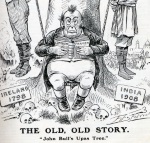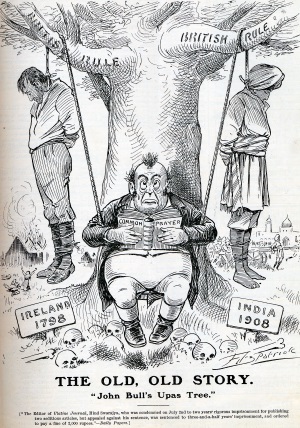Parallels, Ireland and India, 1919.
Published on 17th October 2019
 Irish nationalists drew parallels between their own struggle and that in India, particularly the brutality of colonialism. In mid-1919, the British government faced rebellion both overseas and at home. India was consumed with unrest as demobilised soldiers and economic recession created unstable conditions in the region, particularly the Punjab.
Irish nationalists drew parallels between their own struggle and that in India, particularly the brutality of colonialism. In mid-1919, the British government faced rebellion both overseas and at home. India was consumed with unrest as demobilised soldiers and economic recession created unstable conditions in the region, particularly the Punjab.
On 10 April 1919, rioting began in the city of Amritsar, following the arrest and deportation of Indian national leaders. All meetings and public assemblies were banned in response to the violence; when a large crowd gathered at an enclosed public space known as Jallianwalla Bagh, British and Gurkha troops, led by General Reginald Dyer, opened fire without warning. At the subsequent enquiry in October, Dyer himself justified his actions by stating that it was ‘no longer merely a question of dispersing the crowd, but of producing a sufficient moral effect from a military point of view’ – in other words, setting an example.
 The image opposite, from the satirical newspaper, The Lepracaun, compares British rule in the two countries: executions and burning of homesteads in Ireland, while India saw the brutal practice of execution by cannon, particularly associated with the British suppression of the rebellion of 1857. At home, the campaign against British rule in Ireland commenced with an ambush on a police patrol in Tipperary in January 1919, the same day the First Dáil met at the Mansion House in Dublin.
The image opposite, from the satirical newspaper, The Lepracaun, compares British rule in the two countries: executions and burning of homesteads in Ireland, while India saw the brutal practice of execution by cannon, particularly associated with the British suppression of the rebellion of 1857. At home, the campaign against British rule in Ireland commenced with an ambush on a police patrol in Tipperary in January 1919, the same day the First Dáil met at the Mansion House in Dublin.
Dyer was eventually dismissed from the army but commanded widespread support in the UK, with one MP suggesting that he be sent to Ireland to use similar methods to defeat Sinn Fein. Another warned that the same would soon happen in Ireland: as the Marquess of Crewe said, ‘for "Amritsar" read "Limerick" or "Ennis," or some town in the South and West, and conceive a precise repetition of the circumstances there.’
Dyer was eventually dismissed from the army but commanded widespread support in the UK, with one MP suggesting that he be sent to Ireland to use similar methods to defeat Sinn Fein. Another warned that the same would soon happen in Ireland: as the Marquess of Crewe said, ‘for "Amritsar" read "Limerick" or "Ennis," or some town in the South and West, and conceive a precise repetition of the circumstances there.’
Dublin Irish and Local Studies Collection
The Dublin and Irish Local Studies Collection includes new and second-hand material on Dublin City and County covering a range of books, newspapers, periodicals, photographs, maps, prints, drawings, theatre programmes, playbills, posters, ballad sheets, audiovisual materials and ephemera. Library and archive material cannot be borrowed or removed from the Reading Room. Collections can be accessed by filling out request forms and can be viewed in the Reading Room only.
Blogpost by: Bernard Kelly, Historian in Residence, Dublin City Library and Archive.